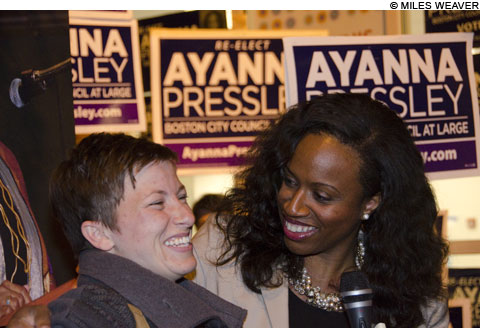
Pressley (right) with campaign manager Jessica Taubman. |
In practical terms, Tuesday's city elections changed very little in Boston. Twelve of 13 city councilors were re-elected, and an Irish-American Dorchester native was selected to replace the Irish-American Dorchester native who is retiring.But politically, there was a sea change Tuesday — or perhaps, as several elected officials said, the cynics and wise guys will finally see how much the city and its politics have evolved.
Ayanna Pressley and Felix Arroyo defied conventional wisdom, not only by finishing first and second in the at-large race, but by doing so in a non-mayoral election year. Only the most "traditional" voters typically participate in such low-turnout affairs, and they are older, whiter, more conservative, and tribal.
But black, Hispanic, and younger voters did come to the polls, in significantly higher numbers than in previous off-year city elections — and voters in the "traditional" parts of the city cast ballots for Pressley and Arroyo.
"The city of Boston proved once again that they look past race when they're looking at a candidate," Arroyo says. "The focus is on the issues and what we are doing for the city."
Third place went to John Connolly, who campaigned in tandem with Pressley. Steve Murphy, an evolving "old Boston" pol, was well back in fourth — edging out Michael Flaherty, who based his attempted return to the council on a strategy of maximizing his base in South Boston, Charlestown, and Dorchester.
Flaherty almost exactly matched his vote total from the last non-mayoral at-large election, in 2007 — but what was good enough to finish first then, put him fifth this week.
Strikingly, as Massachusetts pols obsess over redistricting's impact, voters on Tuesday were defying assumptions about the political primacy of geographical and demographic distinctions.
In Dorchester, it was supposed to be inevitable that Maureen Feeney's successor would come from the voting-rich southern portion of the district. But Frank Baker of Savin Hill easily bested Feeney- and Menino-backed John O'Toole of Cedar Grove — Baker even won in Lower Mills.
And Suzanne Lee came within 100 votes of ousting incumbent Bill Linehan of South Boston.
Linehan was also favored by Menino. In both that and the O'Toole race, Menino and his team appeared to underestimate the extent to which people would resist voting for who they were "supposed" to — based on their neighborhood, ethnicities, organizational membership, or favors owed. This comes on the heels not only of other Menino-machine failures, as with the victory of state representative Nick Collins in South Boston, but of his out-of-sync attempts to bend the city to support Tom Reilly, Hillary Clinton, and Martha Coakley.
Both O'Toole and Linehan tried to win almost entirely with votes from their base; Baker and Lee both explicitly spoke of bringing the neighborhoods together in common purpose. Although Lee narrowly lost, both she and Baker widely exceeded expectations.
"People have been transformed," said State Representative Linda Dorcena Forry. "White people who were there in the busing wars of the '60s and '70s came out to vote for Ayanna Pressley and Felix Arroyo, and black and Latino voters came out to support Frank Baker."